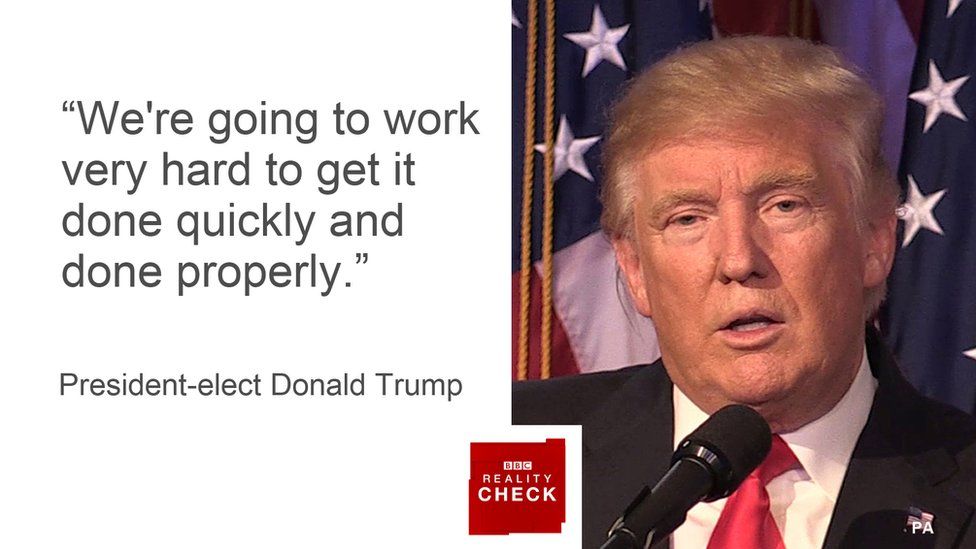Reality Check: Can there be a quick UK-USA trade deal?
- Published

The claim: The UK and USA can quickly negotiate a trade deal
Reality Check verdict: The earliest we could possibly get a deal is 2019, when the UK leaves the EU under the government's current timetable. The complexities of the process mean a trade deal with the US could take considerably longer.
In an interview with the Times, Donald Trump has promised a quick trade deal with post-Brexit Britain.
The president-elect said: "We're going to work very hard to get it done quickly and done properly."
How quickly depends what you mean by quickly and what kind of deal you want, because EU treaties prohibit the UK from conducting formal negotiations while it is still a member of the EU.
Also, remember that this is the same Donald Trump who has attacked American companies that use NAFTA, the North American Free Trade Agreement, to build cars in Mexico and sell them in the USA, and has criticised a proposed pan-Pacific trade deal as the "rape of our country".
He is also opposed to TTIP, the current talks between the USA and EU to reach a trade deal.
But given he seems all in favour of a free trade deal with the UK, how long will it take and what will it involve? Even the easiest trade deal between perfectly willing partners would take years and we won't even be able to begin formal negotiations until we leave the EU, probably in two years.
We will be able to have unofficial talks though, as the prime minister's spokesman put it on Monday: "When she [Theresa May] visits the States she can have an early discussion, but we will abide by our obligations while in the EU."
Technically therefore, the quickest we would be able to get a deal is by 2019, but it is very unlikely to be that quick, not least because the deal the UK ends up doing with the EU would have an impact on the deal it gets with the US.
The first part of any negotiations would be relatively easy.
Tariffs, which are taxes on goods entering a country, are already quite low between the USA and the EU: they average 3%.
A free-trade deal would aim to bring them all down to zero, but it is non-tariff barriers that are the real problem.
This covers everything from bank regulations and car safety standards to animal welfare and environmental protection.
The easiest deal would be for the USA to accept all our standards and regulations and for us to accept all theirs.
But this is where it can get messy.
For instance, the UK has much stricter rules on food standards, GM crops and hormones in farm animals.
Just letting American food into the UK could undermine those standards and put British farmers at a disadvantage.
Then there is the thorny issue of the NHS; do we open it up to competition from US medical companies or do we seek to protect it?
Negotiating an optout for the NHS is perfectly possible, but it would take time and America might ask for something else in return.
The EU and the USA agreed to start negotiating a trade deal in 2011, and those talks have become bogged down because of a whole host of such issues, including how to resolve disputes once a deal is signed.
The UK should be a quicker and nimbler negotiator than the EU, which has 27 governments to keep on board, but that doesn't mean the issues are any less controversial.
- Published16 January 2017
- Published16 January 2017
- Published16 January 2017